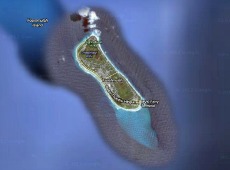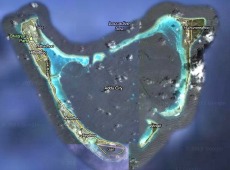With the launch of a US$ 3.83 million eco-tourism wetland conservation project, the Maldives continues to push forward with climate change mitigation and adaptation initiatives, aiming to serve as a model for small island states.
The Environment Ministry eco-tourism initiative will create wetland conservation areas and enhance drainage systems on Hithadhoo Island – an administrative district of Addu City – and on Fuvahmulah Island, in the far south of the Maldives.
The project aims to address climate change impacts by mitigating flooding and erosion due to storm surge, enhance fresh water security, as well as create economic benefits from these sustainable conservation initiatives. Additional mitigation and adaptation components of this Climate Change Trust Fund (CCTF) supported project include coral reef monitoring in Kaafu Atoll, and rainwater harvesting on Ukulhas Island in Ari Atoll.
“This is the first such project in the Maldives with a conservation plan to develop eco-tourism on an inhabited island. Developing a firm and systematic plan to manage and gain economic benefits from these wetland areas could play a vital role in changing the interpretation of the people regarding them,” Environment Minister Dr Mariyam Shakeela told local media during the project’s inauguration ceremony yesterday (May 7).
“We strongly believe that the environment is the only asset that the Maldives has to market ourselves to the international community,” Vice President Mohamed Waheed Deen said while speaking at the project launch.
“Our beauty, whether it is underwater, above water, or wetlands, these are all God’s blessings, nature’s blessings. Unless we know how to look after God’s blessings they will disappear,” he added.
The Vice President also thanked the international community and project donors for recognising that the Maldives has been a minor contributor to global pollution, particularly greenhouse gas emissions, but has “quite unfortunately become a victim” of the resulting climate change impacts.
“I sincerely support the world community for lending support to the Maldives because we believe this is the only way we can make our land, our assets economically viable, and sustainable,” stated Deen.
He emphasised that once the environment has been degraded, it is not possible to restore to its original pristine state, therefore properly implemented environmental conservation can also develop the Maldives’ economy.
Deen noted that the Maldives’ environmental policies have “never changed” and the current government are also “strong environmentalists”, akin to former President Maumoon Gayoom and former President Mohamed Nasheed.
“The Government of Maldives will assure you that the environmental policy maintained by the last two presidents is still maintained,” he stated.
Community-based conservation
The Wetlands Conservation and Coral Reef Monitoring for Adaptation to Climate Change (WCCM) project will be implemented in three phases over 18 months, to be completed in September 2014.
Phase one consists of developing a conservation plan, designing an eco-tourism methodology, and improving water drainage systems. During phase two, eco-tourism facilities will be established in addition to continued water drainage “system rehabilitation”. Phase three includes commissioning a RAMSAR (convention) wetland and national park with eco-tourism.
 “The idea is that these are terrestrial wetlands, in the vicinity of the community, so we are trying to manage these protected areas with the help of the community,” Environmental Protection Agency (EPA) Environment and Social Safeguards Coordinator Ibrahim Mohamed told Minivan News yesterday.
“The idea is that these are terrestrial wetlands, in the vicinity of the community, so we are trying to manage these protected areas with the help of the community,” Environmental Protection Agency (EPA) Environment and Social Safeguards Coordinator Ibrahim Mohamed told Minivan News yesterday.
Mohamed explained that the nearby communities will be the main implementing partners managing the wetland areas and local NGOs are hoped to contribute as well. A “pool of people” will be trained to manage the areas and act as tour guides.
“There will be a visitor centre and a fee and go into the area accompanied by tour guides, it’s going to be like a national park,” said Mohamed.
“These are very beautiful places, that you will immediately sense are very different from the rest of the Maldives, given the [large] size of the islands and the unique way they are connected.
“In Fuvahmulah there are huge fresh water bodies, swampy areas in the depressions of the islands. While the Hithadhoo wetlands are a huge area with mangroves. There are so many birds here, you will always see so many,” he added.
Spanish company Hidra has been hired to prepare the phase one components over the next five months, including the community-based wetland management plan, for which extensive public consultations – including students – are being conducted.
“Then we will start the civil works, such as making the nature trails, visitors center, and bird watching areas,” said Mohamed.
Public private partnerships
The coral reef monitoring component of this conservation project will involve partnering with resorts in Kaafu Atoll, explained Mohamed. They will be trained by the Environment Ministry to monitor water surface temperatures, erosion, biodiversity, bleaching, impacts on fish, as well as “fish landings” to determine where fish being brought to the resorts are caught.
The goal is long-term monitoring of reefs nationwide, however this project will begin by looking at five. Currently coral reef monitoring is limited, because it primarily focuses on bleaching and is only conducted twice annually, in accordance with the monsoon and dry seasons, according to Mohamed.
five. Currently coral reef monitoring is limited, because it primarily focuses on bleaching and is only conducted twice annually, in accordance with the monsoon and dry seasons, according to Mohamed.
“We have started developing the database and the [monitoring] protocols, which have been peerreviewed by international reef ecologists,” said Mohamed.
“The idea is that over 10 to 15 years we will know what is happening to the coral reefs, so that we can determine the impacts from climate change,” he added.
“Exemplary example for small island states”
Mohamed stated that the overall goal is for these wetland and coral reef areas – and the entire nation – to be protected and developed sustainably to become biosphere reserves.
He further explained that the idea behind this CCTF project is for the Maldives to become an exemplary example for other small island states.
“This project can be replicated anywhere in the world, all small island countries can utilize [what the Maldives has developed],” he added.
The holistic approach to wetland and coral reef conservation is necessary because the components are “so interrelated”.
“If you don’t properly manage waste there will be impacts on coral reefs, etc.,” noted Mohamed.
The CCTF serves as the “main umbrella” under which there are three projects in the Maldives: the WCCM, clean energy for climate mitigation, and solid waste management. The WCCM in particular is supported with donated funds from the European Union and Australian Aid, and managed by the World Bank.